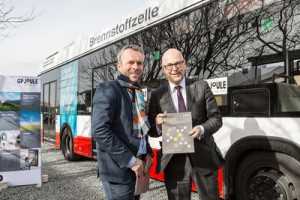Power-to-Gas: Wind energy in the tank generates more acceptance for renewables
GP JOULE submits feasibility study to Minister-President Torsten Albig
 Seven reputable institutions have designed and developed a comprehensive feasibility study on behalf of GP JOULE GmbH for the joint project ‘Akzeptanz durch Wertschöpfung – Wasserstoff als Bindeglied zur Kopplung des Wärme-, Strom-, Industrie- und Verkehrssektors’ (Acceptance through added value – hydrogen as a connective link between the heating, electricity, industry and transport sectors). The study has now been submitted to the Minister-President of Schleswig-Holstein, Torsten Albig, by founder and general manager of GP JOULE Ove Petersen. A key result of the investigation: the interlinking of electricity, heating and mobility through surplus renewable energies creates regional, climate-friendly added value and contributes demonstrably to the rise in acceptance among the population of the expansion of renewable energy.
Seven reputable institutions have designed and developed a comprehensive feasibility study on behalf of GP JOULE GmbH for the joint project ‘Akzeptanz durch Wertschöpfung – Wasserstoff als Bindeglied zur Kopplung des Wärme-, Strom-, Industrie- und Verkehrssektors’ (Acceptance through added value – hydrogen as a connective link between the heating, electricity, industry and transport sectors). The study has now been submitted to the Minister-President of Schleswig-Holstein, Torsten Albig, by founder and general manager of GP JOULE Ove Petersen. A key result of the investigation: the interlinking of electricity, heating and mobility through surplus renewable energies creates regional, climate-friendly added value and contributes demonstrably to the rise in acceptance among the population of the expansion of renewable energy.
The 82-page feasibility study points out how the huge rise in surplus RES electricity in Schleswig-Holstein can be harnessed in the region through power-to-gas technology. The concept: five PEM electrolysers installed in North Friesland convert RES electricity into hydrogen. The heat incurred in the process is fed into pre-existing local heat networks and thus contributes to the heat transition, i.e. the decarbonisation of the heat supply. The hydrogen is stored and subsequently dispensed via two H2 filling stations in Husum and Niebüll to two fuel cell buses which operate public transport routes. In this way, the public transport in the north can gradually be made emission-free, cost-effective and economical, as the study proves.
‘The results of the study are something to be proud of – our joint project proves that hydrogen from renewable energies can create competitive costs and be used as a CO2-free fuel for the mobility sector. There are no significant hurdles for the joint project from a technical, legal consent or economic perspective’, explains Ove Petersen, founder and general manager of GP JOULE. ‘In the long term, buses will therefore not be the only consumer of green hydrogen. When the hydrogen filling stations first go into operation, hydrogen cars, which are already available, will count among their customers. Looking to the future, we see sales markets in rail, ship and freight transport and, what’s more, my dream is to one day drive over the field in a hydrogen tractor!’ says Petersen.
Seven reputable institutions, including Fraunhofer ISI, Fraunhofer ISE and the Foundation for Environmental Energy Law (Stiftung Umweltenergierecht), have developed the feasibility study and have, in the process, also investigated the socio-political, energy, economic and industrial policy dimensions of the joint project. The result: the project enables climate-friendly, innovative technologies at differing levels of maturity to be integrated systemically and in a cross-sector manner. It contributes to the rise in acceptance of RES expansion and the energy transition. Furthermore, it enables us to achieve a significant reduction in CO2 emissions.
‘The joint project “Akzeptanz durch Wertschöpfung” (Acceptance through added value) from GP JOULE is an excellent example of how renewable energies can also be used, in an intelligent way, for heat supply and transport, and as a result climate protection becomes possible for everyone in their daily lives. In addition, the joint project is proof that the added value from renewables in the north is not only limited to the production of wind power. Regional use on site brings about additional economic impulses. Climate protection and business success go hand in hand. The fact that such concepts, and also the innovative electrolysis technology – which makes the conversion possible – were developed and produced in Schleswig-Holstein, shows that the energy transition also makes a lot of sense from an industrial policy standpoint’, comments a pleased Minister-President Torsten Albig. The corresponding PEM electrolyser stacks are developed and manufactured by GP JOULE’s subsidiary company H-TEC SYSTEMS in Lübeck.
Following the presentation and handover of the study, Petersen, Albig and many other guests immediately experienced how the transport transition in North Friesland will feel for many users of public transport, thanks to this project. From the GP JOULE headquarters in Reußenköge, they drove in a fuel cell bus, past numerous wind farms, to the New Energy fair in Husum, and in the process experienced mobility in a hydrogen-fuelled bus live and up close.
Feel free to get in touch if you would like to learn more about the JOULE feasibility study ‘Akzeptanz durch Wertschöpfung’ (Acceptance through added value). We would be happy to send you further information on the feasibility study and the joint project.
Source: GP Joule, presss release, 2017-03-17.
